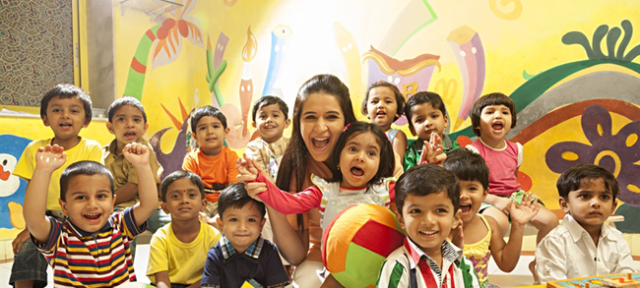We all owe our successes and achievements in our careers to our teachers. Teachers from our schools, colleges and/or Universities are always given the credit whereas our pre-school teachers are conveniently neglected. The society has always agreed in unison that teachers shape the child’s personality and pave the foundation of a child’s future. But emphasis on pre-school teacher’s contribution cannot be forgotten.

The teary frightened children with running nose and a pale face enter the pre-school with their respective parents who are equally anxious is a normal sight for the first few days. Gradually the child makes a connection with the teacher who encourages him/her to make new friends. The child learns to create a comfortable environment and this process is helpful throughout life. In a nutshell, pre-school teachers play an important role in preparing a child’s mindset in commencing its academic journey. In return these teachers must be appreciated for the brilliant job they perform with utmost patience. Appreciation here is respect and in terms of ‘salary’. Unfortunately pre-school teachers are underpaid when compared to the glamorous corporate job holders like investment bankers, management consultants, and engineers.
As per a survey conducted by Indeed, average salary estimate of a pre-school teacher is 14,019 rupees per month in India. These salary estimates are based on 816 salaries that were anonymously submitted to Indeed by pre-school teacher employees, users and are collected from past and present job advertisements on Indeed in the last 36 months. Salaries in private and government pre-schools vary. In a few private pre-schools, less salaries are withdrawn by the employees while they sign against larger figures on paper. There is a variation in the pay before and after confirmation.
Possible criteria for salary:
One of the important criteria for lesser pay could be generalized subject taught and not specialized. More complicated and rigorous subjects are introduced in higher classes, which require teachers with specialized degrees and of expertise in a particular subject. Whereas the emotional involvement of a pre-school teacher could be a lot more intense than a primary and secondary grade teacher. A student of primary and/or secondary standard knows how to conduct and avoid distractions, and hence the teacher can easily concentrate on the subject. A pre-school child is full of tantrums and distractions, that makes a teachers job tougher even if he/she is teaching a simple nursery rhyme or writing alphabets or craft. However the complexities and challenges of teaching to a lower and younger age group should be considered.
Modern challenges for Pre-school teachers:
1) Presently, the workload on pre-school teachers is increasing many folds and on different fronts. The nuclear family system comes with certain drawbacks. Families with both parents working have no choice than leaving the child(ren) with a nanny or at a day care. Less quality time with parents, does impact the child. The mood swings, tantrums and distraction(s) in a child could be an outcome of not spending time with parents. In such cases the pre-school teachers have a dual role to play.
2) With hardly an hour or so of quality time that parents get to spend with children, a lot of expectations are on rise from the pre-school and its teachers. The teachers pour in a great deal of efforts to design challenging and educational games.
Pre-school teaching has evolved leaps and bounds. It is not limited to nursery rhymes and alphabets but developing logical thinking, reasoning, emotional quotient, intellect, fine and gross motor skills, communication skills, and much more that will help the child to enter the world with confidence. This important point should not be ignored.
Teaching is noble profession and Pre-school teachers definitely deserve more respect and appreciation in terms of ‘salary’.

























